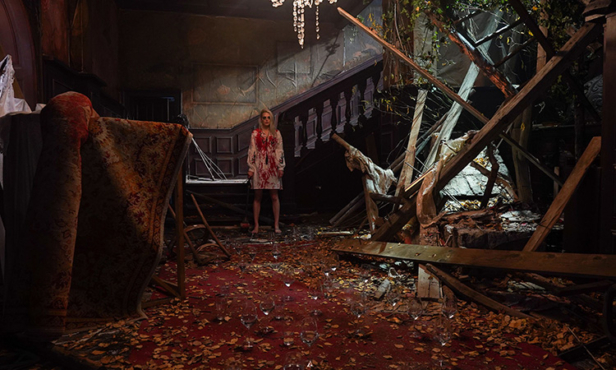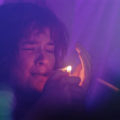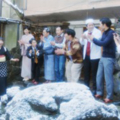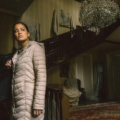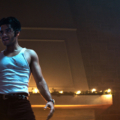Eight Eyes starts as it intends to finish: with an unsettling enigma.
The camera tilts down through the darkness of night to a big fire, onto which some clothing is placed, and in which a charred human head is ablaze. A mask made of wax is held up in the foreground, as a male voice says, in subtitled Serbian: “Who is this? Our new sister. Very good. As if Mama is staring back at me.” And then the film’s title appears, in both English and Serbian, and also in a bright yellow typeface that immediately evokes the stylings of the Seventies (as does the score by Morricone Youth). Whatever the specific details of this prologue might signify, it seems clear that the road travelled by the film will lead to a messed-up family and a murderous ritual – and that we are being taken backwards.
Sure enough the narrative proper begins with black-and-white footage of a Serbian wedding party which New York couple Cass (Emily Sweet) and Gav (Bradford Thomas) have crashed on their belated honeymoon in Belgrade. Gav keeps filming on his newly acquired Super 8 camera, which explains the initial monochrome presentation, and while the rest of Eight Eyes, apart from the odd additional insert of Super 8 footage, is in colour, that too has been shot by cinematographer Sean Dahlberg in now outmoded 16mm on a range of antique cameras.
Yet as the couple’s smartphones and Cass’ headphones will show, the film’s setting is very much post-millennial, so that both Gav’s and director Austin Jennings’ choices to shoot in older media are a backwards-looking affectation, as though both desire to view the present with past eyes. One might even at first suppose that the film’s mystifying title involves a reference to Gav’s Super 8 camera and the archaising perspective that it offers – at least until a different meaning for it will eventually come along.
Early the next morning Cass and Gav will run into Ivan Zuber (Bruno Veljanovski), a local stranger who oddly prefers to go by the name Saint Peter, and who claims to have seen the couple (with his one good eye) at the wedding the day before. Outwardly charming, Ivan easily wins Gav over, although Cass is quick to see the ‘creepy’ side of his forward masculinity. Zuber offers to be their personal guide through Serbia and Macedonia, and no matter how many times he is shaken off by them, they will keep crossing paths with him, in a manner which makes Cass even more suspicious.
Like Gav, but in his own way, Ivan too is fixated on the past. He carries obsolescent VHS cassettes on his person, and the first stop to which he takes the couple is an old munitions factory, abandoned in the 90s, where his dad once worked. Ivan helps his uncle (Jovan Ristić) sell watches, and keeps trying to palm off on Cass a ring with a clock built into it that once belonged to his mother (played on old videos by Gordana Jović). Indeed for Ivan, who will emerge as something of a Norman Bates figure, time stopped when his beloved mother died, and ever since he has been trying to revive her memory.
Eight Eyes sets itself up to belong to the ‘tourist trap’ subgenre – think Eli Roth’s Hostel (2005), John Stockwell’s Turistas (2006) and Christian Yafdrup’s See No Evil (2002) – wherein foreign visitors come a cropper against locals only too happy to exploit their cultural disorientation. For in being bilingual where its American characters are not, Jennings’ film places Cass and Gav at an alienated disadvantage, always dependent on the unreliable Ivan to interpret what is going on, and always knowing less than the viewer (who at least has access to the subtitles).
Still, even as we meet more of Ivan’s family, and things start to go all Texas Chain Saw Massacre in the Zubers’ remote mansion outside Skopje, few will be able to predict the unhinged turn that the film will take.
Like Bigas Lunas’ Anguish (1987), Antonio Tublén’s LFO (2013), Adrián García Bogliano’s Black Circle (2018) and Rob Schroeder’s Ultrasound (2021), this film carefully mesmerises both its intradiegetic and extradiegetic viewers, before finally delivering a full-on Seventies freakout – a cheesily lo-fi lightshow that we can only hope is not having the same influence on us as on Cass.
For here, as in David Cronenberg’s Videodrome (1983), old video recordings are the medium for a transformative possession which brings the dead back to life in the viewer, and which cannot ever simply be left behind or forgotten. Perhaps that is all that cinema has ever been or done.
Co-writing with Matthew Frink, for his feature debut Jennings has crafted a heady love letter to Seventies exploitation cinema, while showing that all the paranoia and xenophobia, sexism and violence of that period die hard. For in this holiday movie, every tourist – and perhaps every cinemagoer – takes back home with them something of what they have experienced, as the old country migrates to the new, and a mummified skeleton finds new flesh.
Eight Eyes has its world première at Fantasia 2023. Read more reviews at SciFiNow
